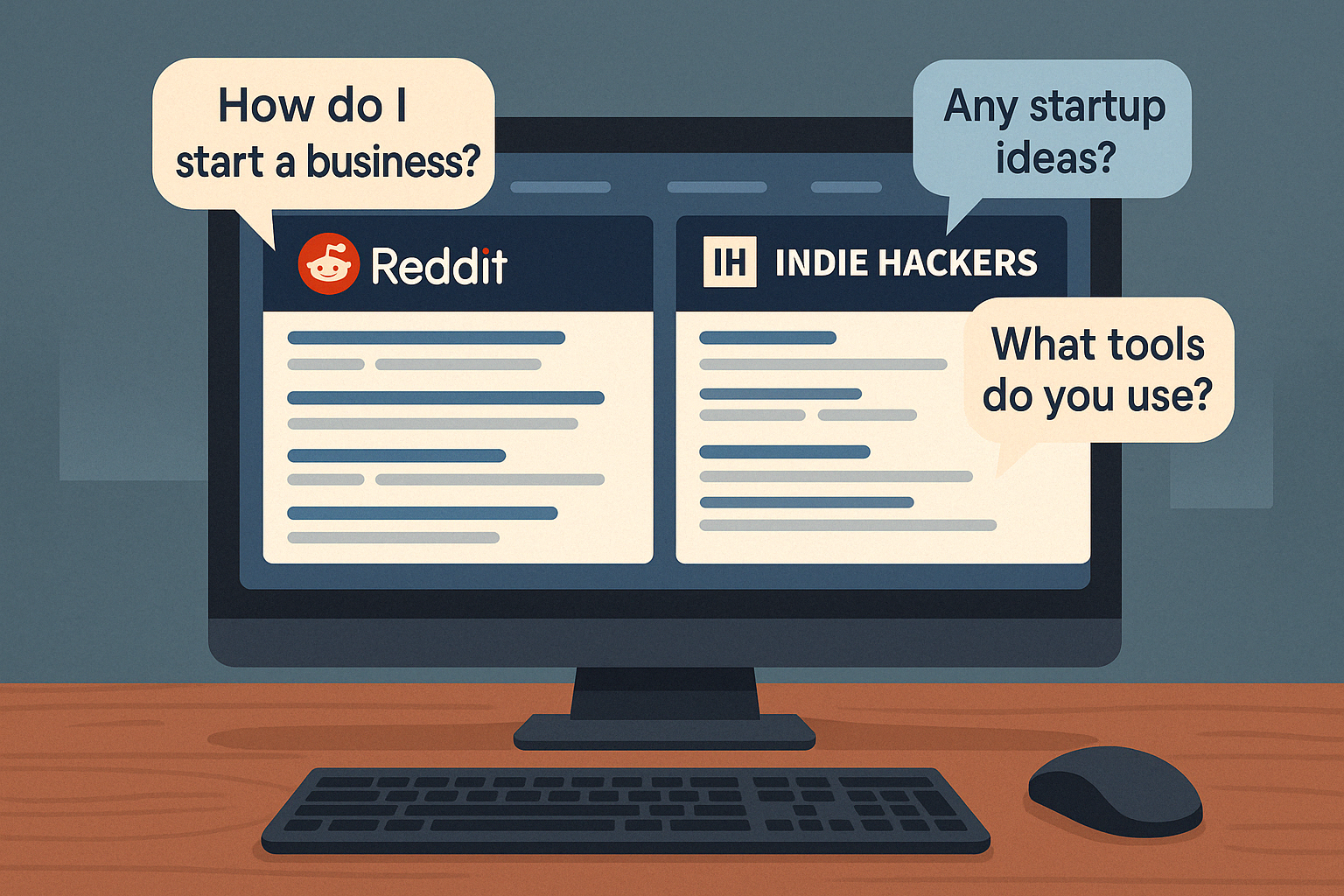Struggling to come up with your next big idea? You're not alone.
Every entrepreneur, from side hustlers to seasoned founders, has stared at a blank notebook wondering what to build and where to start. With so many options and so much noise online, it's easy to feel stuck in idea limbo, especially when you're chasing that elusive "aha!" moment.
But here's the truth: You don't need to reinvent the wheel. The best business ideas aren't pulled out of thin air—they're discovered by paying attention to the right problems, people, and patterns.
This guide will walk you through real-world methods, proven tools, and often-overlooked digital watering holes where business ideas are waiting to be found. Whether you're looking for your first side project or your next startup, you're about to unlock a system for discovering ideas that stick.
1. Start With Yourself
Leverage Personal Experience
Before you dive into market research or viral trends, turn the lens inward. Some of the most successful startups were born from one simple question: What problem do I keep running into?
✅ Solve problems in your own life
Your daily frustrations are fertile ground for innovation. Maybe it's a clunky app that's wasting your time, a routine task that could be automated, or a product you wish existed. If it bothers you, chances are it bothers others too. Think of how Calendly streamlined meeting scheduling or how Notion made note-taking... actually fun.
✅ Turn your skills into services
Your strengths are your shortcut. Are you a designer, developer, writer, or spreadsheet wizard? Package what you know into freelance services, consulting offers, or digital products. Many successful entrepreneurs started by monetizing what they were already good at. No fancy pivot required.
Your life is already giving you clues. The trick is learning to notice them.
2. Ride the Trends
Analyze What's Hot and What's Next
If you want to catch a wave before it crests, you need to know where the swell is forming. Trends can be powerful signals for emerging markets—if you know where to look.
🔍 Explore social media and viral product cycles
Platforms like TikTok, Instagram, and Reddit are goldmines for spotting what's trending. Pay attention to products that go viral seemingly overnight—like Stanley Quenchers or heatless curling rods. When the same item keeps popping up in reels, shorts, or memes, it's time to dig deeper.
Use hashtags, follow trendsetters, and browse comment sections. What are people raving about? What's being shared, remixed, or reviewed?
📈 Use keyword and trend tools for early signals
Don't just follow the crowd; use data. Tools like Google Trends, Ubersuggest, and KWFinder can help you spot rising interest in specific niches before they hit the mainstream.
Search for seasonal spikes, growing subcultures, or long-tail keywords that reveal underserved markets. A quick trend analysis could be the key to your next profitable idea.
3. Mine the Communities

Where Conversations Spark Innovation
People are talking everywhere. The real trick? Listening with purpose. Online communities are where pain points, unmet needs, and half-baked solutions are freely shared every single day.
💬 Dive into Reddit, Quora, Indie Hackers, etc.
These platforms are filled with raw, unfiltered problems people are desperate to solve. Look through niche subreddits like r/Entrepreneur or r/SaaS. On Quora, search for recurring questions around productivity, freelancing, or specific industries. Indie Hackers, Product Hunt, and Hacker News are also teeming with unmet needs and "I wish this existed" posts.
👥 Join niche LinkedIn or Facebook groups
Industry-specific groups are havens for professionals trying to optimize their workflow, find tools, or vent about inefficiencies. Join a few and quietly observe. You'll notice patterns—questions that get asked repeatedly, tools that don't quite cut it, or features users keep requesting.
❓ Pay attention to the questions people ask
What's annoying them? What are they Googling, posting about, or asking peers? Each question is a potential startup seed. When you hear "_Is there a tool that does XYZ?" that's your signal. People don't just want answers; they want solutions. You can build those.
4. Pressure-Test Your Ideas
Validate Before You Build
Not every idea is worth pursuing, and that's a good thing. Testing your concepts early can save you time, money, and a whole lot of heartbreak. Validation doesn't need to be complicated; it just needs to be smart.
🕵️♂️ Research competitors and spot keyword gaps
Start with a quick scan: Who's already doing this? Use tools like Crunchbase or LinkedIn to check team sizes and funding levels. A crowded space isn't always bad, but oversaturation without differentiation is.
Dive into SEO tools like Ubersuggest or Ahrefs to find keyword gaps—underserved search queries that point to real demand. Maybe there's content for "pet grooming software" but none that's budget-friendly or mobile-first. That's your window.
📊 Run simple surveys or polls
Don't guess; ask. Use platforms like SurveyMonkey, Google Forms, or even Twitter/X polls to validate whether people care about your solution. Aim for clarity: "Would you pay for this?" "What's your biggest pain point with XYZ?" Keep it short. The goal is insight, not inbox clutter.
🧠 Look at what others miss, then fill the gap
Sometimes the best idea isn't new; it's better. Better UX, clearer messaging, smarter pricing, or just better vibes. Study reviews, competitor FAQs, Reddit threads. Find the friction points and create something smoother.
5. Browse and Borrow
Use Curated Idea Lists and Frameworks
If you're staring at a blank screen, don't worry. You don't need to start from scratch. The internet is stacked with lists, guides, and battle-tested frameworks that can jumpstart your creativity.
📚 Shopify, SBA, Antler: where the pros start
Start with Shopify's Home Business Ideas, which includes everything from dropshipping to virtual event planning. The U.S. Small Business Administration (SBA) also offers industry-specific guides and business blueprints. And Antler Academy has a goldmine of frameworks designed to turn casual thoughts into validated startup concepts.
Real entrepreneurs use these every day, so why not you?
🧩 Use business idea blueprints and templates
Planning tools like LivePlan and Bizplan help structure your ideas into action. These templates aren't just for MBAs; they're for anyone who wants to stop guessing and start building with clarity.
A good framework doesn't limit your creativity; it directs it.
💡 Bonus: Let AI spot the ideas for you
Platforms like IdeaGiver combine all of the above (frameworks, trend analysis, and real-world pain points) into one experience. By scanning social media conversations and using AI to highlight unmet needs, it helps you discover ideas that aren't just creative but also current. It's a modern layer on top of traditional idea lists, giving you insights you might've missed on your own.
6. Explore High-Impact Resources
Tools Every Entrepreneur Should Bookmark
Sometimes, success is just a matter of knowing where to look and what to use. These platforms, guides, and communities can supercharge your idea generation and execution process. Bookmark them. Refer back often.
💰 Grants & government tools
- SBA.gov - U.S. Small Business Administration: Loans, mentorship, and step-by-step guides
- Grants.gov - Search and apply for federal funding
- SBDC (Small Business Development Centers) - Free business consulting and training
💡 Idea generation platforms
- Shopify's Home Business Ideas - E-commerce-focused inspiration
- Antler Academy - Frameworks from startup investors
- One.com Business Idea Examples - Quickfire inspiration for digital ideas
👥 Community-based resources
- RevGenius - A free sales/marketing community with founder-friendly insights
- Indie Hackers - Real stories from builders and bootstrappers
- Product Hunt - Daily launches and feedback from early adopters
📝 Business planning software
- LivePlan - Business planning with forecasting and financials
- Bizplan - Guided business plan builder for startups and solo founders
7. Bonus: Validation Tools That Work
Put Your Idea to the Test
Before you dive into logo design and landing pages, let the data weigh in. These tools will help you assess how real your idea's potential really is.
🚀 BuzzSumo, Google Ads Planner, Reddit tools
- BuzzSumo - Analyze what content is getting shared, and why
- Google Ads Keyword Planner - See search volume and competition for your product or idea
- Reddit Keyword Tool - Extract popular keywords and problems directly from Reddit threads
📊 Check search volume, pain point frequency, and more
Don't just follow your gut; validate with metrics. Look at how often a problem is discussed, how many people search for it monthly, and what kinds of solutions already exist. This data can guide your decisions and help you build something that people actually want.
Your idea doesn't have to be perfect; it just needs proof of life.
Conclusion
Finding a great business idea isn't about waiting for inspiration to strike; it's about knowing where to look and how to listen. From tapping into your own experiences to scanning social trends, mining communities, and using smart tools to validate your thinking, there are more paths to innovation than ever before.
Whether you're solving your own problem, watching what's trending, or exploring underserved niches, the methods we've covered are your toolkit for discovery.
Your next idea is out there; you just need to look in the right places.
Start by picking one method today and dig in. You don't need perfection, just momentum. The rest will follow.
FAQs: Finding Business Ideas
1. What's the easiest way to come up with a business idea?
Start with your own problems. Many great businesses begin by solving a frustration the founder personally experienced. If something slows you down, confuses you, or costs too much—there's likely a business opportunity there.
2. How can I tell if a business idea is good?
A good idea solves a real problem, has clear demand, and stands out from existing solutions. Use tools like Google Trends, surveys, and Reddit research to validate the idea before building anything.
3. Where do entrepreneurs find inspiration online?
Communities like Reddit, Indie Hackers, and LinkedIn groups are full of real-world questions and unmet needs. You can also use platforms like Product Hunt, BuzzSumo, and Shopify's business guides to explore proven ideas.
For an even deeper edge, tools like IdeaGiver tap into social chatter across the web and surface startup ideas backed by actual user pain points.
4. What tools help with researching business ideas?
Try keyword tools like Ubersuggest and Google Ads Planner to assess demand. Use BuzzSumo for content trends, and platforms like Antler Academy or LivePlan to structure and develop your ideas.
5. I have too many ideas; how do I pick one?
Filter based on your skills, interests, and the problem's urgency. Look for overlap between what excites you, what you're good at, and what people are willing to pay for. Then validate with data and feedback before going all in.
